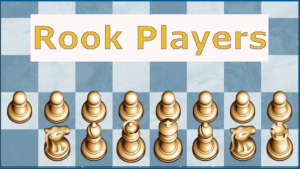Chess Caviar
|
One of the most interesting continual threads in the chess.com forums is called "Post Your Own Miniatures Here." Many very good players post their less-than-thirty-moves games showing off their skill, and sometimes brilliance, in punishing weak moves by uncovering concealed and surprising tactics in some position. One of the frequent posters in that thread is Bill Wall who may be considered the Miniature King since he has probably published more miniatures, both in books and on the web, than anyone else in history. Oddly enough, "miniatures" in chess didn't always automatically refer to short games. Up until around 1940, the term "miniature" conjured up thoughts of short puzzles or problems - actually sometimes not even all that short, since one early 20th century chess author described miniatures as "problems with at most seven moves." The were some, though very few, exceptions, such as "Memorable Chess Games, Brilliants and Miniatures, with Notes, Queries and Answers." by William Moffatt in 1913 (just two years before the death of Moffat, founder of the British Chess Company), one of the earliest books I found that focused partly on "minatures." It isn't until 1941 that I uncovered another book on minatures that used the term in the title: "200 Chess Minatures" by Julius du Mont (an Englishman who, like Mark Taiminov years later was both a master-level player and a concert pianist, who also was chess editor of "The Guardian" and "The Field.") published in 1941 followed by his "100 Soviet Miniatures" published the following year. It seems around this time the meaning of "miniatures" transitioned from short problems to short games. How short the games must be seems to change with each person asked. It can be less-than-18, less-than-20, less-than-24, less-than-30, but seldom more than 30 moves. All this is by way of introduction to one of the earlier published collections I've come across that included "miniatures" or short brilliancies. William Ewert Napier didn't use that then uncommon term, but rather the more poetic term "chess caviar." His book "Paul Morphy and the Golden Age of Chess," copyrighted by Napier in 1934 but not published until I.A. Horowitz did so in 1957, 5 years after the Napier's death, didn't concentrate on Morphy although Fred Reinfeld contributed a paricularly charming biography of Morphy as a preface. Rather the book covered, and uncovered, games played during the century between the 1834 Labourdonnais-M'Donnell match and the book's completion in 1934. In his introduction Napier wrote: The main object of this work is the organized preservation of excellence in chess play. Worthy and signifant games, long hidden away in old and precious journals, and memoranda, are to be dusted off and brought to light, if they have spark and courage - and withal, that charm and zest which, in the Middle Ages, the Chronicles relate, lifted chess to a respected place among the eight accomplishments of a gentleman. His second chapter (of fifty-nine), called Chess Caviar presented 26 brevities and an introduction. This article will be a selection of a mere dozen of those : 2. CHESS CAVIAR Like wild oats, these little adventures in somewhat risky, uncanonical regions make good novelettes or biting sermons - according to their employment by lovers of errant, spicy chess or by tart critics much given to cynical asperity. I like them for their wanton vivacity. They are liable as mischievous youngsters are. And chess, the game, ought to regard them tenderly because they candidly tend to keep that young and green which is in danger of becoming dour and kippered in the clubs wholly devoted to the art. A batch of short, pithy games makes a fest for an evening. It was Don Quixote who said, "If there be troutlets enough, will they not be the same thing as a trout?" The axiomatic species of game, telling its own tale and not long in telling, is useful for the sharp impression it writes on the tablets of memory. One old criticism is that in a very short game there must be at least one abominable move; but I think the long lost game could be similarly judged. However, it is the vengeance and not the misconduct that gives us pleasure; and if gross misconduct tends to disqualify, it were better to do it in one act than in four. It is not easy to picture a more comical disaster than a dud with a long fuse. Blackmore puts it aptly in his Lorna Doone: "All things being full of flaw, all things being full of holes, the strength of all things is in shortness." And incidentally, Blackmore was a chess devotee and played much at Simpson's Divan in the Strand. A Memorable Freak
|



